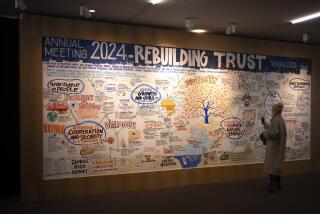THE SUMMIT IN TOKYO : In 11 Years, Little to Remember : Concrete Action Rare at Previous Meetings
TOKYO — It’s not that the annual economic summit meetings of the seven leading industrialized democracies never accomplish anything.
Just three years ago, in Williamsburg, Va., President Reagan scored what one U.S. official called “an incredible coup” by extracting a commitment from reluctant allies to support the deployment of U.S. intermediate-range nuclear missiles on European soil.
And in 1978 in Bonn, President Jimmy Carter made a deal with the allies in which he would decontrol U.S. oil prices in exchange for their promise to stimulate their economies. “Policy-wise, it was the right decision,” recalled Stuart E. Eizenstat, Carter’s domestic policy chief at the time. “Politically, it hurt” because U.S. gasoline prices soared.
This year’s meeting in Tokyo, for example, might well be renamed the Chernobyl summit because of the attention commanded by the accident at the Soviet Union’s Chernobyl nuclear power plant. Although weeks of advance planning went into the issues of trade and terrorism, those subjects have been upstaged by the Soviet mishap.
They’re ‘Yawn City’
But in the 11-year history of economic summits, Williamsburg and Bonn are the exceptions. As one White House official bluntly observed, “Summits are generally yawn city.” Except for their “sideshows,” he added, speaking on the condition of anonymity, the meetings have produced little worth remembering.
Last year’s gathering in Bonn was overshadowed by the controversy over Reagan’s visit immediately afterward to a German war cemetery at Bitburg, West Germany, where some members of Hitler’s Waffen SS are buried.
And U.S. officials say that the 1984 summit in London is memorable chiefly because Reagan took a side trip to France to deliver an emotional tribute to American soldiers killed during the D-Day invasion 40 years before.
“The summit itself was a bore,” the White House official recalled, noting how British Prime Minister Margaret Thatcher insisted on a joint statement extolling nothing more controversial than democracy.
Among summit planners, there is always the hope that this meeting will be different, that world events will force the leaders gathered in Tokyo to take concerted action in a way they have rarely done before. Even the skeptical White House official conceded, “This is one summit where it will be very difficult to paper over the problems.”
Those problems include trade, terrorism and, now, the Chernobyl nuclear disaster. Ironically, a collective response on the nuclear issue is likely to be the easiest for the summit seven.
Because of the magnitude of the Chernobyl accident and its direct impact on several of the nations represented here, an agreement should be easy to achieve on a joint statement calling on the Soviet Union to provide more information about the episode and to be a more responsible member of the world community in the future.
The issues of trade and protectionism, perhaps the stickiest of the summit, will take a back seat to these political issues, perhaps to the relief of the allies.
Pending in the United States are new tariffs that the Administration is prepared to slap at any moment on a range of European products in retaliation for similar protectionist levies taken by the European Economic Community. “That’s some kind of curtain-raiser,” an American official said.
Reagan is prepared to talk tough about the need for joint diplomatic and economic action against Libya for its role in sponsoring international terrorism. U.S. summit planners say they expect a general statement abhorring terrorism, coupled with “a quiet commitment” to take further, more specific action.
Ringing Declarations
But even if the summit seven align themselves rhetorically on the value of free trade, the horror of terrorism and the irresponsibility of the Soviets, they will be following a familiar pattern in the summitry that began at Rambouillet, France, in 1975: ringing declarations that are noticeably lacking in anything concrete.
Robert D. Hormats, a former State Department official known as “Mr. Summit” because of his role in planning economic summits under Presidents Gerald R. Ford, Carter and Reagan, said that it is unfair to judge these gatherings by concrete results.
“I don’t think we can expect them to be decisive,” he said, “but they do give leaders a sense of collective support for policies.”
When Reagan was asked recently what he hoped to accomplish at the Tokyo summit, he spoke hopefully of achieving “a meeting of the minds” on global terrorism but shied away from citing any ambitious goals on either the political or the economic agenda.
“Talking to each other instead of about each other,” Reagan said, “is worth the trip.”
More to Read
Sign up for Essential California
The most important California stories and recommendations in your inbox every morning.
You may occasionally receive promotional content from the Los Angeles Times.










